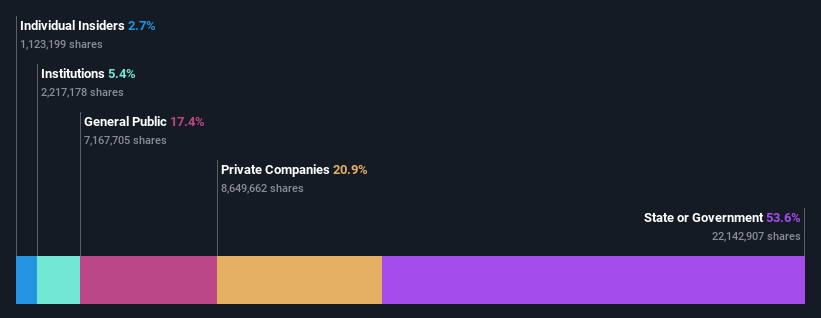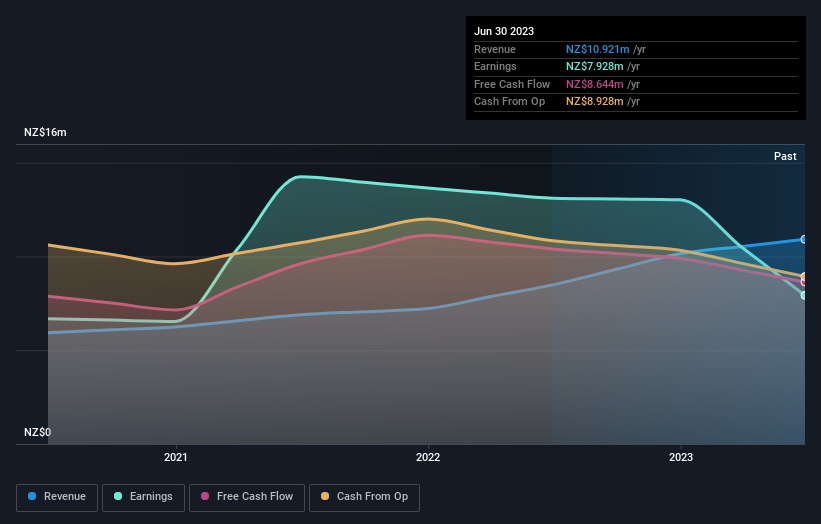Marsden Maritime Holdings Limited's (NZSE:MMH) top owners are state or government with 54% stake, while 21% is held by private companies
Key Insights
Marsden Maritime Holdings' significant state or government ownership suggests that the key decisions are influenced by shareholders from the larger public
The largest shareholder of the company is Northland Regional Council with a 54% stake
Using data from company's past performance alongside ownership research, one can better assess the future performance of a company
If you want to know who really controls Marsden Maritime Holdings Limited (NZSE:MMH), then you'll have to look at the makeup of its share registry. With 54% stake, state or government possess the maximum shares in the company. In other words, the group stands to gain the most (or lose the most) from their investment into the company.
Private companies, on the other hand, account for 21% of the company's stockholders.
Let's delve deeper into each type of owner of Marsden Maritime Holdings, beginning with the chart below.
Check out our latest analysis for Marsden Maritime Holdings
What Does The Institutional Ownership Tell Us About Marsden Maritime Holdings?
Institutional investors commonly compare their own returns to the returns of a commonly followed index. So they generally do consider buying larger companies that are included in the relevant benchmark index.
We can see that Marsden Maritime Holdings does have institutional investors; and they hold a good portion of the company's stock. This can indicate that the company has a certain degree of credibility in the investment community. However, it is best to be wary of relying on the supposed validation that comes with institutional investors. They too, get it wrong sometimes. If multiple institutions change their view on a stock at the same time, you could see the share price drop fast. It's therefore worth looking at Marsden Maritime Holdings' earnings history below. Of course, the future is what really matters.
We note that hedge funds don't have a meaningful investment in Marsden Maritime Holdings. Looking at our data, we can see that the largest shareholder is Northland Regional Council with 54% of shares outstanding. With such a huge stake in the ownership, we infer that they have significant control of the future of the company. In comparison, the second and third largest shareholders hold about 20% and 2.4% of the stock.
Researching institutional ownership is a good way to gauge and filter a stock's expected performance. The same can be achieved by studying analyst sentiments. Our information suggests that there isn't any analyst coverage of the stock, so it is probably little known.
Insider Ownership Of Marsden Maritime Holdings
The definition of an insider can differ slightly between different countries, but members of the board of directors always count. Management ultimately answers to the board. However, it is not uncommon for managers to be executive board members, especially if they are a founder or the CEO.
Insider ownership is positive when it signals leadership are thinking like the true owners of the company. However, high insider ownership can also give immense power to a small group within the company. This can be negative in some circumstances.
We can see that insiders own shares in Marsden Maritime Holdings Limited. As individuals, the insiders collectively own NZ$5.3m worth of the NZ$196m company. Some would say this shows alignment of interests between shareholders and the board, though we generally prefer to see bigger insider holdings. But it might be worth checking if those insiders have been selling.
General Public Ownership
The general public, who are usually individual investors, hold a 17% stake in Marsden Maritime Holdings. While this group can't necessarily call the shots, it can certainly have a real influence on how the company is run.
Private Company Ownership
Our data indicates that Private Companies hold 21%, of the company's shares. Private companies may be related parties. Sometimes insiders have an interest in a public company through a holding in a private company, rather than in their own capacity as an individual. While it's hard to draw any broad stroke conclusions, it is worth noting as an area for further research.
Next Steps:
I find it very interesting to look at who exactly owns a company. But to truly gain insight, we need to consider other information, too. Take risks for example - Marsden Maritime Holdings has 1 warning sign we think you should be aware of.
Of course this may not be the best stock to buy. So take a peek at this free free list of interesting companies.
NB: Figures in this article are calculated using data from the last twelve months, which refer to the 12-month period ending on the last date of the month the financial statement is dated. This may not be consistent with full year annual report figures.
Have feedback on this article? Concerned about the content? Get in touch with us directly. Alternatively, email editorial-team (at) simplywallst.com.
This article by Simply Wall St is general in nature. We provide commentary based on historical data and analyst forecasts only using an unbiased methodology and our articles are not intended to be financial advice. It does not constitute a recommendation to buy or sell any stock, and does not take account of your objectives, or your financial situation. We aim to bring you long-term focused analysis driven by fundamental data. Note that our analysis may not factor in the latest price-sensitive company announcements or qualitative material. Simply Wall St has no position in any stocks mentioned.

 Yahoo Finance
Yahoo Finance 

